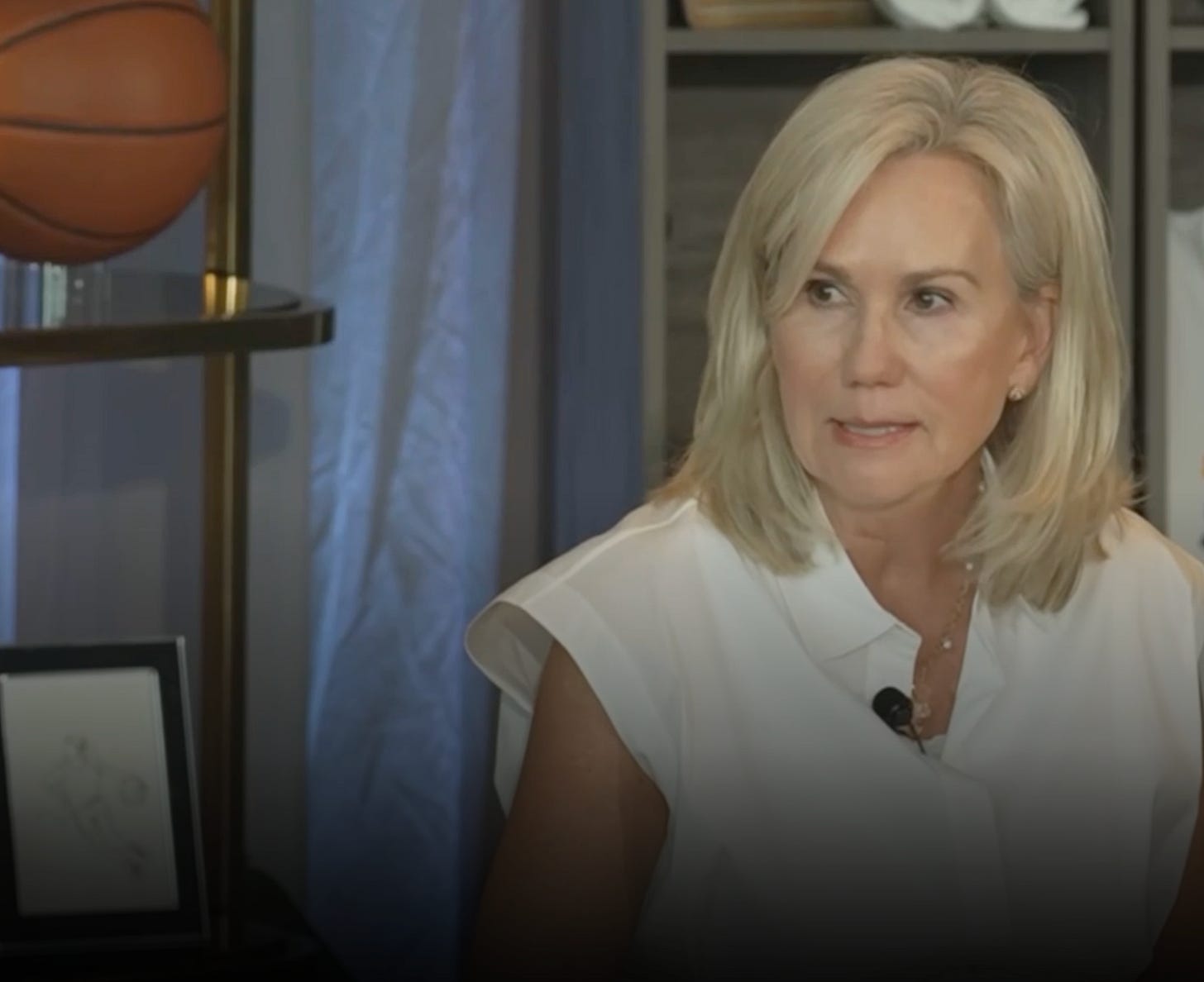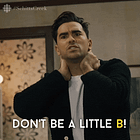The One With A Bridge And A Crystal Ball
Read an exclusive interview with former WTA President and current Unrivaled Commissioner Micky Lawler about how women's basketball today is following the WTA legacy, even showing tennis a new way.
Welcome back! In today’s edition, I’m bringing you a bridge between tennis, the OG of ultra-bankable women’s sports, and Unrivaled, the disruptor aiming to build on that tradition and the WNBA’s rise in profile, stars, fan base, and business success. That bridge has a name that will be very familiar to the tennis experts: Micky Lawler, the former WTA President. Also, in this edition, Gabriel Diallo going places and Jannik Sinner losing sleep.
I’ve had a musing on my mind for a while, but it’d have made today’s edition way too long, so I’ll send you a bonus edition by the end of the week. The next paid edition should be up on Thursday with another exclusive interview.
This publication is supported by readers, so if you like what you’re reading, don’t hesitate to spread the word, try a paid subscription, like this post, or leave a comment, as it helps TSS discoverability. You can also prefer to buy me a cuppa!
MEDIA/BUSINESS
INTERVIEW - MICKY LAWLER
Funnily enough, women’s tennis has created a blueprint for the WNBA and Unrivaled, and nowadays, tennis as a whole watches women’s basketball, wondering if they have figured out what they, as the OG, might have lost on the way. Also, if you look closely, Unrivaled is a lot about tennis. How? Well, not only is Coco Gauff an investor in this new women’s basketball league in the US, but former WTA President, long-time tennis executive, and advocate for female athletes’ rights, Micky Lawler, is their Commissioner. Tennis, like Formula 1, is a global niche. A unique positioning. But the WNBA and now Unrivaled are starting to shine very brightly in a lot of markets while being unapologetic about who and what they represent. So obviously, I couldn’t resist very long to dig into this common DNA.
Micky Lawler joined the Unrivaled Adventure in 2023, becoming the league’s first-ever Commissioner. Unrivaled first season concluded in March. This year, for the first season of the 3x3 league, Unrivaled was nearly profitable. The disruptor, playing during the WNBA’s off-season and thus able to attract some of the WNBA’s biggest names, has already sparked sponsors’ interest, as evidenced by its recent welcome of Sephora as a beauty partner. You can watch more from Micky Lawler about the business of women’s basketball here.
If you’re not new to the TSS space, you’ll know that I’ve often mentioned how the WNBA is increasingly becoming an interesting mirror to tennis as a niche finding its way into the mainstream. As a niche being culturally relevant. As the fastest-growing women’s sport that keeps taking some big money off the tennis table. Their athletes are still far from earning what tennis players earn on and off the court, but their profile and opportunities are on the rise like nobody else’s business. The sport’s storytelling is, like Formula 1, an astounding success, highlighting all the areas where tennis is right now struggling. And now, they’ve even found a way to let another format in and share their stars with that new franchise. Both my eyebrows are up.
I’m very grateful to Micky Lawler, someone who has always been passionate about the game and its athletes, for taking the time to chat about her new adventure with Unrivaled after over three decades in tennis, serving as a perfect witness to the change of the tide.
“Tennis Can Learn A Lot From Growing Sports Like Women's Basketball.”
Carole Bouchard, The Tennis Sweet Spot: It's interesting to see someone who worked so long in women's tennis go to Unrivaled, which is also a women's sport breaking barriers. How has it been to be immersed in that? I'm sure you found some common ground.
Micky Lawler: Yes, it was actually somewhat like going back to 1988 when I started working in women's tennis. I was also working in men's tennis at the time, but my first exposure to women's tennis was in 1988. There are a lot of similarities to where women’s tennis was at the time and where women's basketball is now. In a way, it is like going back in time, but with a crystal ball of the future at our disposal. When I heard about Unrivaled and what the two players, Brianna Stewart and Napheesa Collier, and the two co-founders, Luke Cooper and Alex Bazzell, were doing, I believed in this big idea. It was love at first sight. This spoke to me very naturally, and I was drawn to it from the start.
Carole Bouchard, The Tennis Sweet Spot: It must be fun for you because you know the road. As you said, you know the path that has to be taken. The context has changed significantly, but do you feel that it's the same battles, or perhaps it's easier now because women's sports are experiencing a boom?
Micky Lawler: I think we have evolved a lot since 1988. The opportunity for women's sports is now clear to everybody. There are differences. Back in 1988, we accepted somewhat the secondary role of women's sports. But in my mind, it was, “Yes, we are secondary, but we are going to grow into that equality position.” That doesn't mean that we have to be the same, but we are going to grow this business so that we can materialize the value that we all know is there. You can do that when you've got superstars to work with that drive the sport forward.
“It is like going back in time, but with a crystal ball of the future at our disposal.”
In those days, Chris and Martina, after Billie Jean's generation, then it was Stephanie Graff, Monica Seles, and Gabriela Sabatini. We went to all these markets where men's tennis was not. But it always felt like women's tennis was secondary. Now, I think the whole wave of women's sports is catching on everywhere. The other very big thing is that in tennis, you can go all over the world. You can do that in basketball as well, but it's different because you have seasons. You have the WNBA that plays from May through September. Then you have Unrivaled in the winter. Traveling with a whole team, it's not easy. It caters very much to the American sports culture, which is a big part of the American culture.
Carole Bouchard, The Tennis Sweet Spot: It was a bold move from you. Not only did you change sports, but you also changed format in that sport. Unrivaled is a bit of a disruptor. What was the mindset?
Micky Lawler: The idea makers in this, Brianna Stewart and Napheesa Collier, legends in the game, along with Alex Bazzell and Luke Cooper, of course, know basketball in and out. They are very established, big names. Then you've also got the wave of Caitlin Clark coming in, Angel Breeze coming in, and Paige Bueckers now. What we saw in tennis in the 80s, we're now seeing in basketball. That is very clear. Champions drive interest, audience, and opportunity.
“The consumption of sports was evolving, and some changes were necessary.”
However, in tennis, it also became clear to all of us that the consumption of sports was evolving, and some changes were necessary. Also, looking back to the late 80s and how we built the WTA Tour, putting tournaments in different markets, in many emerging markets, we found ourselves, when I left in 2023, with the feeling that it was now a lot for an athlete. There's great prize money, but to what extent? Can you do some things to better protect player health, to really not make this an impossible task? You want to protect the athletes. You want to push the human performance boundaries, but you want to keep the integrity of them as well.
So about the Unrivaled format, the basketball experts, Luke and Alex, Napheesa and Brianna, were saying that if we play three-on-three on a compressed court, we are creating basketball excellence. Plus, both Napheesa and Alex, especially Alex, worked closely with Kobe Bryant, and he coached his daughter's team. They would practice this three-on-three because the men have these three-on-three pickup games, very casual in public courts. This is how the three-on-three game on a compressed court evolved. Give space to the athletes, give them a chance to really perform, to be good at everything, to be good at guarding, defense, and attack. That's how that came to be. And then the other thing was we need to get rid of dead time.
Carole Bouchard, The Tennis Sweet Spot: We hear that a lot in tennis, too.
Micky Lawler: Yes, I know that well. And how do you build something that works both in venue, live, and for television? So that was also the goal for television, to have predictable, one-hour games. Now, that extended a little bit because the games were so close. So they ended up being an average of 1 hour and 15 minutes. I was so focused on that because that's what was hard when we were selling tennis, trying to find good broadcasters to partner with. Tennis is so unpredictable. And then you've got these matches that end at two o'clock in the morning. That’s really tough.
Carole Bouchard, The Tennis Sweet Spot: That was a bold move to create another sport inside the sport. You have so much experience, but were you sure it’d be fun and a success, or did that feel like taking a big risk?
Micky Lawler: For sure, there are days when you're confident. There are days when you're not confident. That's life. Up and down. There were days when I thought, “Oh my God, we have a lot to do.” When we walked into the venue, there was nothing. Everything was left to be done. Our in-venue production team, together with broadcast, helped build this venue in 37 days. It was unbelievable. But you know what? It was one of the most fulfilling things I've ever done, really.
“Here, it seems there's just much more alignment.”
Carole Bouchard, The Tennis Sweet Spot: I was having a look at the list of your duties (“Oversee and manage day-to-day operations for Unrivaled, including launching the league, driving direction and strategy, leading partnership initiatives, overseeing all revenue verticals, and being a voice to the athletes.”) It's a lot of things and a lot of hats.
Micky Lawler: Yes, but the team is really great. And everybody's wearing a lot of hats. Alex Bazzell and Luke Cooper are incredibly hardworking, so it's not like I'm pushing a boulder up a hill by myself at all. In fact, in a way, in a way, it's easier than in tennis because, in tennis, you've got the partnership between tournaments and players, but sometimes it's a partnership that is difficult. You've also got an impossible calendar. There are just so many things to juggle. I always thought my responsibility was, ultimately, to grow the sport, but the philosophies on how to grow the sport are very different. Here, it seems there's just much more alignment. We're all going in the same direction. And we have wonderful investors.
Carole Bouchard, The Tennis Sweet Spot: Tennis has been discussing the need for a commissioner for some time. And now you have that job, but in another sport. So, can you say that, yes, it’s what’s needed?
Micky Lawler: What's needed is the semantic value of what a commissioner does. That commissioner really functions as a compass and needs to have only one goal, one driving force, and that's the growth of the sport. There should be no gray areas. There are going to be sacrifices, there are going to be big wins, but you can't do it all. Growing prize money is the right thing to do, yet there are many ways to do that, and the integrity of the athlete's health has to be front and center. And it's the same in basketball.
Carole Bouchard, The Tennis Sweet Spot: Were you surprised to find any common points in your new job compared to all your years in tennis, maybe in the relationship with the athletes or the way it’s all run?
Micky Lawler: There are common points. Athletes are athletes. They are the best in the world for a reason. I'm used to that and respect that very much. One of the reasons I love working in sports is because not everybody can say that they work with the best in the world, right? The difference is that they are part of a team. It's the beauty of basketball, really.
The beauty of tennis is that you're out there on your own, and you have to figure it out, and it's the gladiator scene. Over here, the beauty lies in women coming from different backgrounds and having completely different experiences growing up, but somehow, they pull it together. Additionally, the importance of a coach who can bring together diverse personalities and identify the strengths and weaknesses of every individual to make the team as strong as possible. It's so interesting. You see the leaders, and you see the different personalities come together and how they all have a really key role in making this work.
Carole Bouchard, The Tennis Sweet Spot: Coco Gauff is an investor in Unrivaled, which is good timing right now! Is it important to have female star athletes joining from different sports to support?
Micky Lawler: Yes, I think so because it validates the big idea. To be supportive of one another is key. It's been key to us in the business world, in media, and in every industry. And it's great to see Coco. She was at a Liberty game last week as well, and that was wonderful to see. When she came to Unrivaled, the athletes were just going, “Oh my God!” We have other female athletes like Sue Bird, Megan Rapinoe, and Michelle Wie. Other big names. But what's also really important is to have investors like Stephen Curry, Michael Phelps, Carmelo Anthony and also Giannis Antetokounmpo. The HeForShe movement is also really great to see. We have this opportunity, now let's all go for it.
Carole Bouchard, The Tennis Sweet Spot: Also like Alex Morgan, Megan Rapinoe, and Coco Gauff: They are star athletes, but they’re also activists. You’ve been fighting for the rights of female athletes for decades. Was it also important for you to be involved in a movement that goes maybe beyond just the sport?
Micky Lawler: Very, very, very important. I grew up instinctively feeling like there was this work to do. We lived in Argentina, and I lived there from the ages of five to 12. My brother was three years younger, and then we have a little sister who is eight years younger than I am. There's a big rivalry between Boca Juniors and River Plate, and my father would take my little brother to the match, so I would say, “Well, what the heck?” Of course, my father was my biggest supporter, and he was everything to me. But then we would go back to Holland, and he would watch sports with my uncle, and there was track and field, and the women would run, and my uncle would say, this looks like a man running; there are so many muscles. That's how people talked in those days. But I could see my father kind of coming to terms with it all when we would talk about Borg and McEnroe, and it was like, sure, but how about Evert and Navratilova? There was this evolution, and I was very attuned to it.
When I told them I wanted to work in sports, my dad said, “What are you going to do, what do you mean work in sports? No." I went to graduate school, and I had to finish a PhD. So it was, “No, no. Like, what are you talking about?” I said, okay, let me take a year to work in sports, and if it doesn't work out, I'll go back and finish my PhD. And so they said, okay, great. And that's how it went. But in those early days, for women, working in sports was like, “Are you kidding?” It was just so interesting, and so it’s been a big part of my life.
“I think the two who took Billie Jean’s Original nine role are Brianna and Napheesa.”
Carole Bouchard, The Tennis Sweet Spot: There’s something in the air about how the WNBA and now Unrivaled are taking things where women’s tennis left it in terms of fighting for women’s sports rights and business. It has to be funny for you, going a bit full circle like that, as what we see now in women’s sports has been built on the success of female tennis players.
Micky Lawler: Yes. Tennis, for sure, has come the longest way. And they've done that through building the foundation of the sport. I remember in the eighties, when the Iron Curtain came down, when the Berlin wall came down, going to Eastern Europe and really developing the tour in that direction, then going to the Middle East and then to China. One memory that stands out is when I was in Mexico City because we brought a doubles exhibition to test whether women's tennis would work. The secret ingredient was Anna Kournikova. It was packed. Packed.
At that moment, it was 1998. I sat there, and I thought, “See, the gender is not the differentiator here; it's the star power.” That’s still absolutely true. So there's a big opportunity now that the curtain has been pulled back in women's basketball. Now you can see there are phenomenal athletes, and it's a great entertainment product. I think the two who took Billie Jean’s Original nine role are Brianna and Napheesa. They were always convinced. They never doubted, actually, but they still put their necks on the line, and they worked really, really hard.
Carole Bouchard, The Tennis Sweet Spot: I'm impressed because if you were to transpose Unrivaled to tennis and tell the WTA or the ATP that we're going to introduce another franchise, another format, I have a feeling it wouldn’t go down well. Yet, with Unrivaled, it seems you’ve found a way to work with the WNBA. Maybe it will give ideas to other sports!
Micky Lawler: Yes. But the difference is tennis goes from late December until November. Where are you going to put an alternative format? Here, you had an opportunity. And it’s also interesting what's happening in women's basketball now, and in university and in college basketball and in college sports now that there's been a ruling in favor of the house, so college athletes can be paid. So it's a very interesting situation because there were players this year who decided to stay in college because they could play where they wanted and get more money than they could if they turned pro. And because college basketball is played in the fall and winter, it is the biggest women's basketball platform still. So that is now going to change with the new CBA, the new collective bargaining agreement because they have a new television agreement, which is a big deal. That's a big game-changer. So we'll see what comes out of that. But it's interesting that the pro league now has to compete with college.
“Many of the things that were difficult to do or impossible to do in tennis, we did them here, and they work.”
Carole Bouchard, The Tennis Sweet Spot: Now that you've been into Unrivaled for some time, are there moments when you're like, “Tennis should really take this from Unrivaled”?
Micky Lawler: Yes. Many of the things that were difficult to do or impossible to do in tennis, we did them here, and they work. They work. The equity piece can be handled in many different ways. So in tennis, it's through prize money. Here, we do pay higher salaries on average than anywhere else. But the players have equity in the league, and that is really great because - and not that they wouldn't do this if they didn't have equity - but the players understand that the more they do, the more we are able to diversify this business and respond to every need, the better the league is going to do.
And I remember having a conversation with YouTube about three years ago and learning that the NBA, for example, was moving a huge portion of their production budget, their content broadcast production budget, to digital content. And I thought, absolutely, that's what needs to happen. I remember having these conversations with all of our media partners, asking how we support the broadcast. How do we tell the stories that make the broadcast relevant? How do we change the post-match press conferences where it's always the same story? Every minute that every athlete gives, we need to make that count.
I remember having a press conference in Singapore for the WTA Finals, and we were streaming the press conference on Facebook. And one of the UK writers said, “How could you do this? We've traveled all this way. You know, you need to give it to us.” And so I tried to explain that if we grow the reach of this voice that every athlete carries, and if we reach the Facebook audience, which if you translated it in world economies, it was the fifth economy in the world, you were then reaching billions of people. So, doesn't that make your stories more relevant? Basketball and every women's sport took a lot from tennis, but now tennis can learn a lot from growing sports like women's basketball. And the growth rate of women's basketball is pretty darn impressive. It's all so positive. It really is. There’s a big opportunity here.
READ MORE about women’s sports business and the storytelling issue in tennis:
SOME BREAK POINTS…
It’s all about saving match points these days! Elise Mertens saved 11 (!!) of those in the semifinals of the Libema Open against Ekaterina Alexandrova. 5 on her serve after she broke back at 4-5 and another 5 on her serve at 5-6, and then one last match point in the TB. The Belgian went on to win that match and so a spot in the final, 2-6, 7-6(7), 6-4. If you want to know how Mertens escaped, you can watch it here. Also, it was a fairytale until the very end because Mertens went on to win the title (6-3, 7-6(4)) against Elena-Gabriela Ruse. It’s her first title on grass and the number 10 in her career.
Watch Jannik Sinner talking about some sleepless nights following that loss in Paris and how he still prefers to focus on the positive. “I had already a few sleepless nights, but I think every day it gets better,” Sinner told the ATP. “It was for sure a tough loss. I still think about these couple of points, and it won’t stop here – I know that. (…) You can still see the positive side,” he said. “I’ve never played tennis on clay like this, I went to Rome, I made the final there, in Paris I made the final of a Grand Slam – Amazing – and then the level that [me and Carlos] have played was extremely high, so I was happy to be a part of this.” As for Carlos Alcaraz, he has taken again his now (party-)infamous trip to Ibiza.
Grass season and the records, it keeps going! After the youngest male player in the quarterfinals, here comes the oldest woman player in the final of a WTA 500, as Tatjana Maria qualified for the final at the Queen’s following a victory over Madison Keys (6-3, 7-6(3)). Maria was on a 9-match losing streak before the start of the tournament. And guess what? She clinched the title on Sunday, defeating Amanda Anisimova (6-3, 6-4). Four Top 20 wins in a row for the German qualifier!
Gabriel Diallo is going places this year! On Sunday, the Canadian, who’s a blondie now somehow, added a new milestone by clinching the title at the Libema Open, beating Zizou Bergs in the final in straight sets (7-5, 7-6(8). It’s Diallo’s first-ever ATP title. Stay for that hug at the net and the biggest smile on Diallo’s face with his trophy. He climbed 11 spots on the ranking ladder to now land at the number 44. Show me a player who nobody will want to play on grass for years to come! If you want to know more about Diallo’s rise in 2025, you can catch up here.
Taylor Fritz did what he does best on Tour these days: he beat Alexander Zverev. Where, this time? In Stuttgart to win the title, his fourth trophy on grass in his career, his ninth trophy overall. Another consequence of that victory from Fritz is that he’s now overtaking Novak Djokovic in the ranking, gaining three spots to land at No.4.
US player Ben Shelton is making his entry into the Top 10 this week for the first time in his career, as Australian Alex de Minaur has left it. He’s the third of his country to figure in it now with Fritz and Tommy Paul, but the latter will be out of it next week as he won’t be able to defend the 500 points of his win at the Queen’s last year (see why below).
Goran Ivanisevic has shared a few words about starting to work with Stefanos Tsitsipas. I will never understand why they decided to start on grass instead of clay, as they were already in talks around the start of the clay season. But let’s see if Ivanisevic, who’s always made a huge impact on the players he coached (Cilic, Raonic, Djokovic), can bring Tsitsipas back on track.
MENS SANA IN CORPORE SANO
The clay season has left a hefty bill to pay for some players, and so for the tournaments coming right after. The Queen’s event lost three big names in the process: Lorenzo Musetti (adductor tear), Matteo Berrettini (abdominal injury), and Tommy Paul (abdominal injury), who won’t be able to defend his crown.
Emma Raducanu’s body is still struggling with the demand of professional tennis. The British player had to withdraw from Berlin due to a back issue that’s been hampering her for weeks now.



















